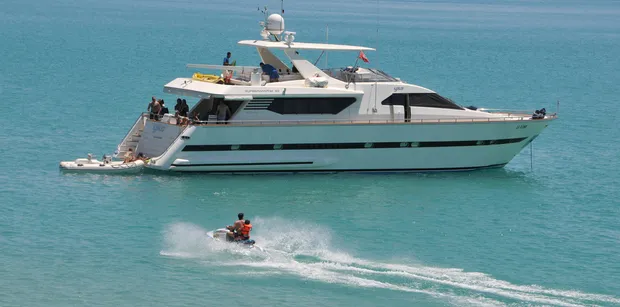There are many different types of chartering; these include by voyage and time as well as bareboat or skippered. However, whatever type you choose, chartering can expose you to some fairly significant risks if you don’t plan carefully or fail to take the necessary precautions.
 If you don’t know what chartering is, this is bound to have gone completely over your head, so allow us to explain:
If you don’t know what chartering is, this is bound to have gone completely over your head, so allow us to explain:
What Is Chartering?
Basically, chartering just means “hiring out”, but specifically when used in the context of a boat. Some owners might charter their boat on the odd occasional to help allay the running costs. Others may start a business where they regularly charter their boat to turn a profit from their investment.
No matter which course of action you’re thinking of taking, you have to know the rules before dipping your feet into the water. If you don’t want to end up lost at sea (no more water puns, we promise), keep the following things in mind. (Please note: some of the following information may be relevant specifically to those living in the United Kingdom. Please be sure to double check the information below before chartering your yacht.)
Register
Make sure to register your boat on the UK Ship Registry. You’ll need either a part 1 or a part 3 registration; choose the former if you’re going to be chartering overseas at all.
If you’ve already registered it as a boat used for personal pleasure, you’ll have to inform the Ship Registry that this will be changing to commercial use.
Insure
As soon as you’re registered, you should tell your insurance company about your plans to charter. Most standard (read: pleasure) insurance companies will be happy to cover skippered chartering, but if you want bareboat the charterer will have to get it themselves.
If you plan on chartering a lot (like running a business out of it) then you’ll have to change your policy to accommodate commercial use; this will likely run up a higher premium.
Comply
Your vessel must be MCA compliant. Since 1993, all UK-based chartered boats have to comply to the Maritime and Coastguard Agency’s code of practice, which includes construction, equipment and operation regulations.
If your boat doesn’t comply with the code, you’ll have to shell out for new equipment, otherwise you’ll be breaking the law. One example regulation: boats over 13.7 metres long have additional fire safety and lifesaving appliance rules.
Survey
A marine surveyor should be hired to inspect your vessel. If the surveyor finds your boat to be suitable for commercial chartering, you will be eligible for your MCA SCV2 commercial licence.
Check Restrictions
If you’re berthing your vessel in a marina, you should check to see if they hold any restrictions on chartering. Sometimes, chartering will incur higher mooring fees, so you will want to make sure to find out their stance. The marina’s business terms and conditions should give you all the information you need.
International Protection
If you are using bareboat chartering and doing so in international waters, the British Red Ensign protection will not always be applicable to your vessel. The charterer must be either a UK national or a member of the British Red Ensign for this protection to be afforded, so do your research.
Tax
Chartering a yacht in the EU is classed as a supply of services; this means that, for VAT purposes at least, it is a taxable supply. You will have to account to the HMRC for any charter hire inside the waters of the European Union.
Sometimes, depending on the value of your vessel and how much chartering you’re doing, you may be able to take advantage of some tax reliefs via corporate structuring.
Get Licenced
A final, somewhat obvious tip – anyone in charge of the navigation of a chartered boat must be licenced. Make sure you make a copy of the skipper’s licence.
Jamie King is a UK-based freelance blogger. This article was written on behalf of Shipserv, online providers of marine supplies.
